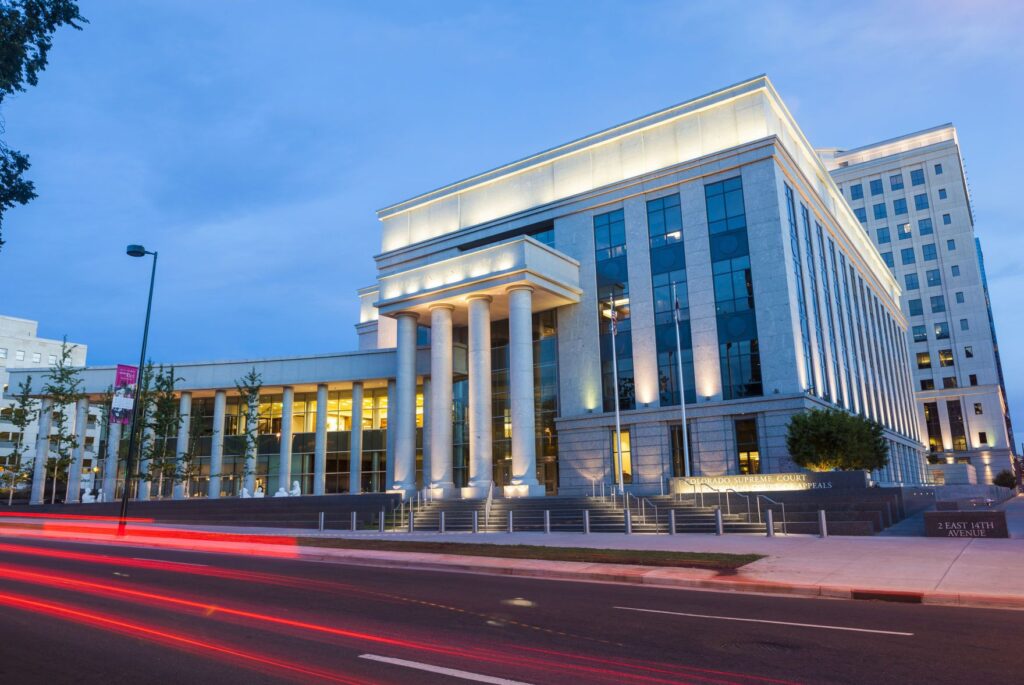Colorado Supreme Court considers restoring multimillion-dollar award to RTD subcontractor
The Colorado Supreme Court announced on Monday that it will consider whether the Court of Appeals incorrectly threw out a $5.7 million award to a company that helped build a commuter rail line and, in doing so, endangered the ability of contractors to seek money they are owed going forward.
At least three of the court’s seven members must agree to hear a case on appeal.
The justices also indicated they may intervene in a child neglect proceeding in Denver Juvenile Court. The Supreme Court maintains secrecy over filings in such cases, meaning the details are shielded from public view. The court only described the legal issue as whether the attorney for a child can continue litigating a neglect case even after the government moves to withdraw the allegations.
In the contracting case, Ralph L. Wadsworth Construction Company became a subcontractor on the construction of the Regional Transportation District’s N Line to Thornton. Regional Rail Partners was the overarching contractor. The project encountered delays and defects, with both entities pointing the finger at each other.
RLW filed a verified claim under the Public Works Act claiming Regional Rail Partners owed it more than $12.7 million. Broadly, the law ensures financial security for subcontractors on public projects. If a subcontractor provides “labor, materials, sustenance, or other supplies” and the contractor has not paid, the subcontractor files a verified statement of the amount due to start the process for reimbursement.
In 2003, the legislature added a condition to the act. If a subcontractor’s claim is not reasonably related to the amount owed and the subcontractor knows it, the subcontractor “shall forfeit all rights to the amount claimed.” For 20 years, the Court of Appeals had never addressed what that condition meant.
After a trial judge awarded RLW $3.8 million in damages and $1.9 in unpaid funds — totaling $5.7 million — a three-judge Court of Appeals panel wiped away the entire amount.
The panel determined RLW had relied on “impacts, delays, disruptions, interference and other problems associated with the Project” as grounds for its complaint. But Judge Ted C. Tow III reiterated the purpose of the Public Works Act is for subcontractors to file claims over services undisputably provided — not for financial damages stemming from disputed delays.
Because RLW asserted it was owed an amount that was not reasonable under the Public Works Act, the panel decided the 2003 condition, as written, meant RLW had forfeited its right to seek compensation.
“In our view, the language,” wrote Tow, “is unambiguous: the claimant forfeits the right to pursue any remedy for that amount. While this sanction may seem drastic, it is the only reasonable reading the statutory language can bear.”
On appeal to the Supreme Court, multiple outside groups weighed in to label the Court of Appeals’ interpretation a disaster for the construction industry. The industry associations representing general contractors and electrical contractors in Colorado argued companies now cannot go to court for money they are owed without worrying about triggering the forfeiture provision and walking away with nothing.
“In light of these holdings, subcontractors will be reticent to bid on critical public works projects in this State,” added the attorneys for RLW in their petition.
Regional Rail Partners downplayed the implications for public works projects, noting the real problem was RLW had overreached and knowingly claimed it was owed money that the Public Works Act did not allow it to recover.
The Supreme Court will analyze what types of costs subcontractors are allowed to include in their verified claims against contractors, and whether the 2003 change to the Public Works Act really does shut down all avenues to recover money owed if the amount requested is unreasonable.
The case is Ralph L. Wadsworth Construction Company, LLC. v. Regional Rail Partners et al.













